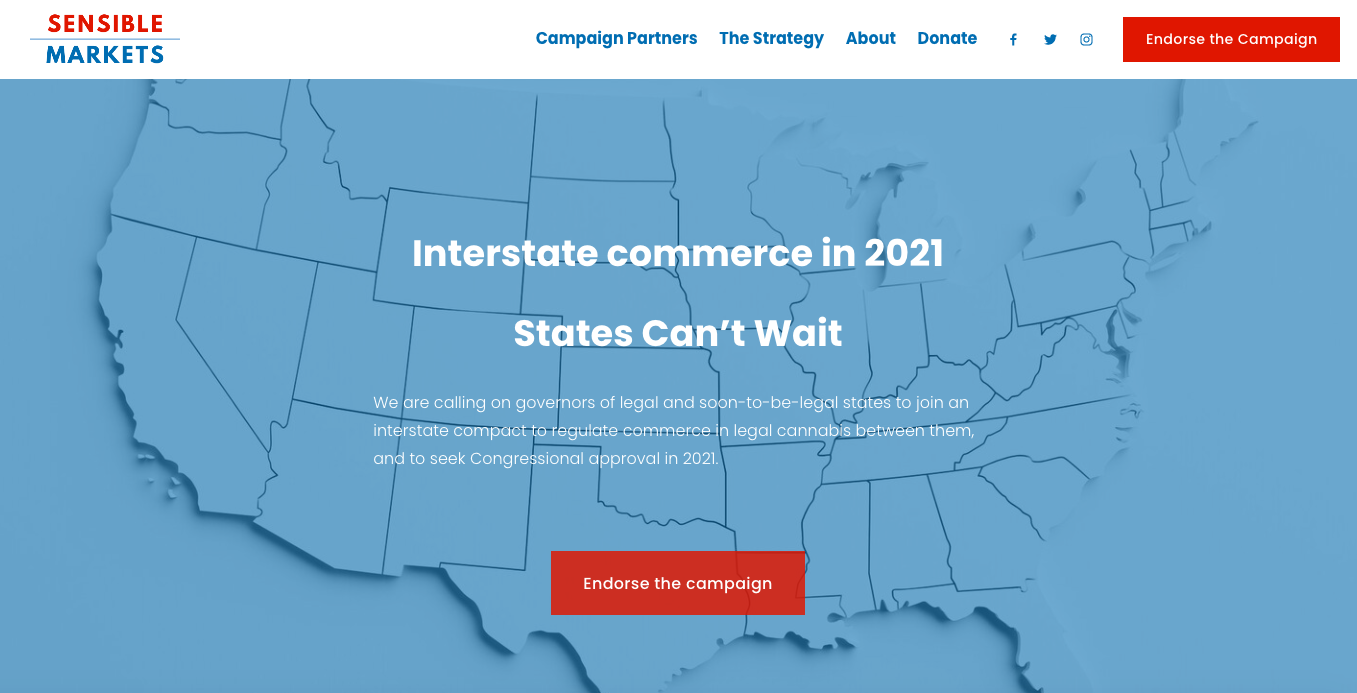A very interesting report from Marijuana Moment that may well start the process of creating a national cannabis market in the US without the need for Federal legislation?
We imagine this will make Oregon very happy. It’s over a year since the state’s house passed legislation in order to try and create a legal route for the state’s over production issues.
MM write
A coalition of advocacy groups and marijuana businesses have unveiled a unique plan to legalize interstate cannabis commerce regardless of ongoing federal prohibition.
The Alliance for Sensible Markets campaign will be pushing governors from legal and likely soon-to-be legal marijuana states to enter into an interstate compact—a constitutionally recognized agreement between two or more states—establishing a framework for cannabis to be transported and marketed across state lines.
Such an arrangement hasn’t been tried before for marijuana, but if the new effort succeeds in getting at least two states to sign on, the compact would then be transmitted to Congress, where lawmakers would have the choice to codify the agreement. It could be passed as standalone legislation or attached as an amendment or rider to a broader bill.
Read the full MM report at.
New Marijuana Coalition Unveils Plan To Legalize Interstate Cannabis Commerce
The Alliance for Sensible Markets is a non-profit coalition of business and advocacy leaders committed to a thriving, just, and sustainable legal cannabis industry.
Our goal is to right the economics of legal cannabis by legalizing commerce between participating legal markets under interstate agreement in 2021, unleashing a much needed torrent of investment, expansion, business formation, and jobs across both producer and consumer states.
Interstate commerce in two steps
-
Governors of at least two legal or legalizing states agree to an interstate compact to regulate commerce between them.
-
Forward Congress for approval in 2021
What can governors do?
We are asking governors of established producer states and legalizing consumer states to form a compact regulating commerce in cannabis between them. In light of the historic jobs and economic crisis that all governors are facing, and the imperative to get investment, business formation, and jobs happening NOW, which interstate commerce would enable, we are asking them to make that commitment by early 2021.
The compact would then go to Congress for approval, either as a stand-alone bill or as an amendment or rider to larger legislation.
With multiple governors behind it and the economic imperative for economic recovery, buttressed by the media attention that we will generate around the issue and the broad political support for states’ rights in legal cannabis, an interstate compact is likely to gain Congressional approval in 2021, regardless of which party controls the US Senate.
What is an interstate compact?
Interstate compacts are agreements between states. The Port Authority of New York and New Jersey, for example, was created by interstate compact. The U.S. Constitution recognizes these agreements.
An interstate compact would set out the broad regulatory parameters of interstate commerce in cannabis, particularly as they concern public safety, meaning testing, tracking, and labeling. For example, multiple acceptable testing standards could be recognized in the compact, and individual states would be free to choose among them.
Why states can’t wait
As states face one of the deepest recessions in our history, with tens of millions out of work, legal cannabis is poised to bring robust and sustained economic stimulus. We just need to get the economics of our industry right. Governors are the cannabis industry’s post powerful allies — many recognized cannabis businesses as essential amid widespread economic shutdowns in the early days of the Covid-19 pandemic — and in 2021 they will be looking for every opportunity to spur economic activity, investment, and JOBS. We are here to help. And it won’t require a government bailout or a handout.
Don’t fence me in
Markets are meant to efficiently move goods from where they are best produced to where there is the greatest unmet demand. Interstate commerce will allow newly legal states to get their industries up and running in months, rather than years, instantly unleashing billions in investment, rapid business formation in retail, distribution, delivery, manufacturing, product development, and a host of allied support businesses, and creating tens of thousands of jobs. In currently legal producer markets, we will see an immediate and significant increase in valuations for thousands of farms and companies, spurring new investment, expansion, and hiring as farms, processors, manufacturers, brands, and allied businesses prepare to serve vastly expanded markets.
There is perhaps no other industry in the US private sector that is poised to unleash so much economic activity, so broadly distributed, as legal cannabis. We just need to get the economics right.


















